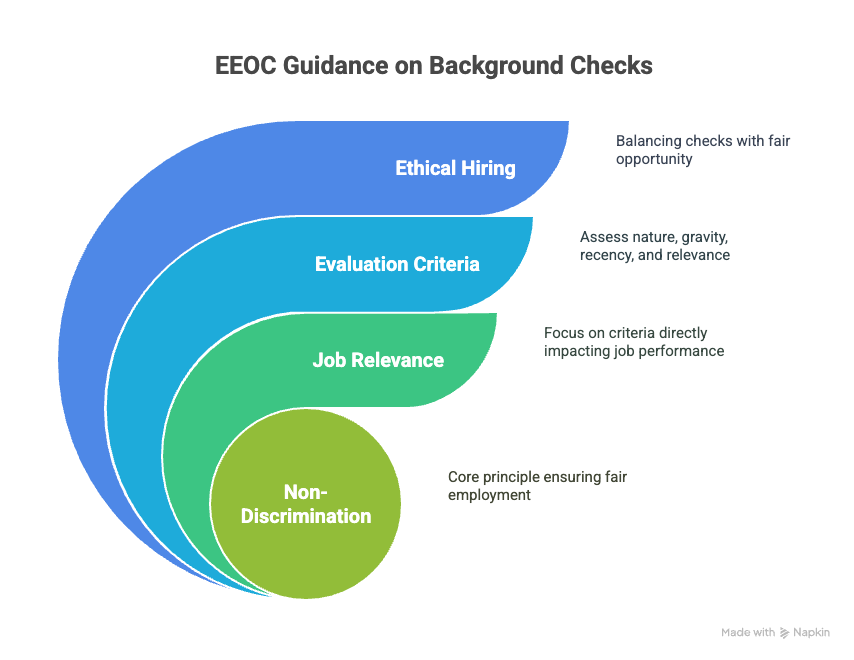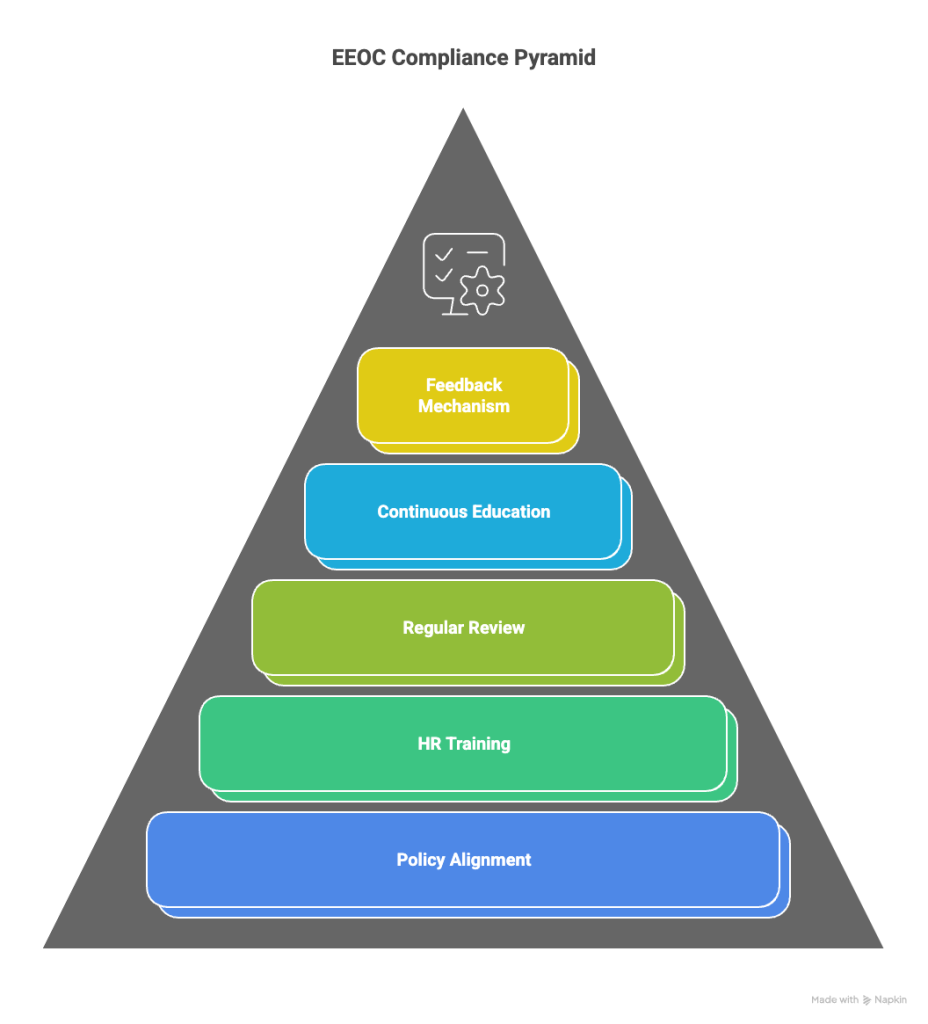Navigating the complex world of hiring in the healthcare sector requires a firm understanding of legal respects and best practices. One of the key players in this landscape is the Equal Employment Opportunity Commission (EEOC), which provides critical guidance on conducting background checks within medical hiring. This guide will equip you with a comprehensive understanding of how to apply EEOC guidance effectively, maintain compliance, and implement best practices in healthcare recruitment.
Key Takeaways
- Ensure your healthcare hiring practices align with EEOC guidelines to promote non-discrimination and equal opportunity.
- Conduct background checks that are relevant to job roles, focusing on the nature and timing of any criminal offenses.
- Customize your hiring process by tailoring background checks to specific healthcare roles, considering patient safety and privacy.
- Implement individualized assessments to fairly evaluate each candidate’s history in the context of the specific job.
- Regularly review and update your hiring practices to stay compliant with EEOC guidelines and foster fair employment opportunities.
Introduction
The Equal Employment Opportunity Commission (EEOC) plays a vital role in shaping employment practices across various sectors, including healthcare. Their guidelines ensure fair hiring, emphasizing non-discrimination and equal opportunity. These principles resonate deeply in medical hiring, where diverse and competent staffing is essential.
EEOC's influence extends into scrutinizing background checks, a key component of the hiring process. For medical institutions, where trust and reliability are paramount, aligning with EEOC guidance is not optional—it's necessary. This guide is crafted to help you navigate these standards, providing a straightforward approach to incorporating EEOC recommendations into healthcare recruitment practices.
As we delve deeper, you'll find actionable insights on applying these guidelines effectively, ensuring compliance and promoting fair employment opportunities in your organization. Use this as your resource to understand challenges and implement best practices in medical hiring.
Understanding EEOC Guidance on Background Checks
The EEOC emphasizes that background checks must align with non-discrimination principles. At its core, the EEOC discourages using background checks as a barrier to employment opportunities. The primary concern is to prevent discrimination based on race, color, religion, sex, national origin, or any other protected class.
In healthcare, the stakes are high. The EEOC understands that background checks in this field are about more than just hiring practices—they're tied to patient safety and trust. Therefore, healthcare employers should focus on criteria that genuinely relate to the job. Consider the relevance of past convictions; for instance, a financial fraud conviction might matter for a billing position, but not for a janitorial role.
The EEOC advises conducting checks that evaluate the nature, gravity, recency, and relevance of any conviction. This approach helps to ensure that you are making decisions based on factors that truly impact the job at hand. When asking about past records, always ensure your questions are job-related and consistent with business necessity.

Think about the candidates you're evaluating. Ask yourself: Does their past truly affect their ability to perform this role? Reflect on the fairness and relevance of the information you're gathering. Balancing thorough background checks with fair opportunity is essential for ethical hiring in healthcare.
Tailoring Background Checks to Healthcare Settings
Applying EEOC guidance in healthcare background checks requires understanding the balance between compliance and effective hiring. In healthcare, you must consider patient safety and privacy, making careful vetting crucial. The EEOC allows for background checks but stresses non-discrimination and relevance to the job role.
Look first at the role's requirements. For a position involving patient care, scrutinize relevant criminal history without bias. For instance, a conviction related to theft may be less concerning for a billing role than for direct care staff.
The EEOC advises customizing each check, focusing on factors like the nature of the crime, time elapsed, rehabilitation evidence, and relevance to duties. A drug-related offense from a decade ago might not be disqualifying if the applicant demonstrates changed behavior.
Ensure your process is consistent. Document criteria and procedures for each role, apply them uniformly, and provide candidates an opportunity to explain their background. This tailored approach respects legal standards and promotes fair hiring. Are your current practices adjusted to meet these specific healthcare needs?
Conducting Individualized Assessments
Individualized assessments are at the heart of aligning with EEOC guidance. They ensure that background checks do not result in blanket exclusions and instead consider the nuances of each applicant’s situation. Treating people fairly requires you to look beyond the surface. Consider the nature of the offense, the time elapsed, and its relevance to the role. For instance, a minor misdemeanor from a decade ago might not impact the ability to perform a nursing role effectively.
To conduct an individualized assessment, start by identifying the essential tasks of the healthcare position. Next, evaluate whether the applicant’s past directly affects their capability to perform these tasks safely and effectively. Gather additional information from the individual, giving them a chance to explain or provide context.
Consider the example of a candidate with a dated theft charge. Without an individualized approach, their application might be unfairly dismissed. However, by assessing their recent job history, professional references, and behavioral changes, you might find a reliable, transformed candidate ready to contribute positively.
Individualized assessments are not just about compliance; they are about fairness and avoiding unnecessary biases in hiring. Have you thought about how this approach can complement your recruitment strategy? This method is crucial to fostering an inclusive and legally compliant hiring process in healthcare, helping you select the best talent without unfair exclusion.
Legal and Ethical Considerations
Maintaining fairness and ethics in hiring is essential, especially in healthcare. You need to address legal requirements while ensuring ethical treatment of applicants. One key legal insight is the need to comply with Title VII of the Civil Rights Act. This law prohibits discriminatory practices in employment, including unfair background checks.
Consider the 2012 EEOC guidelines that emphasize the need for employers to avoid practices that might disproportionately exclude certain groups. For instance, blanket exclusions based on criminal history could violate these guidelines. It’s important to evaluate each applicant individually rather than imposing a blanket rule.
Confidentiality is another critical area. When conducting background checks, protect the privacy of applicants. You have access to sensitive information, and mishandling this could lead to legal challenges. Implement protocols to restrict access to this data and ensure it’s used only for hiring decisions.
Employee rights during the background check process are also crucial. Be transparent about the background check procedures, including what will be checked and how the information will be used. This transparency builds trust and reduces potential litigation from misunderstandings.
Consider posing these questions: Are your background checks compliant with EEOC guidelines? Are you balancing thorough checks with ethical responsibility? By reviewing these aspects, you can align your hiring processes with both legal standards and ethical best practices, creating a more equitable hiring environment.
Implementing Best Practices
Aligning your hiring policies with EEOC guidelines protects your organization and promotes fairness. Begin by embedding EEOC principles in your recruitment processes. Drafting a comprehensive hiring policy is crucial. This document should outline clear procedures that adhere to non-discrimination practices. Include criteria for evaluating candidates and a protocol for handling criminal records. It’s vital that these policies are transparent and consistently applied.

Training your HR team is equally important. Regular workshops can help your staff understand the nuances of EEOC guidelines. Ensure they know how to conduct individualized assessments. This helps prevent any form of discrimination and ensures each candidate is judged on relevant merits, rather than assumptions based on past records.
Stay proactive by reviewing your practices regularly. This helps in adapting to any new regulations or guidance from the EEOC. Also, maintain open lines of communication with legal counsel to navigate complex cases effectively.
Engage in continuous education. Encourage participation in seminars or courses on EEOC compliance. This not only keeps your team updated but also reinforces the importance of ethical hiring practices. Consider using case studies of successful implementations as learning tools.
Lastly, establish a mechanism for feedback. This can help identify gaps in your current hiring process and provide insights for improvement. By fostering an environment where feedback is valued, you encourage a culture of accountability and continuous improvement. This proactive approach ensures your organization remains compliant and upholds the values of fair employment.
Conclusion
It's crucial to apply the EEOC principles effectively to ensure a balanced and lawful hiring process. Each point discussed aims to equip you with the knowledge to conduct fair and compliant hiring in the medical field.
Take a moment to assess your current hiring practices. Are you ensuring non-discrimination and fair opportunities in every step? Adhering to EEOC guidelines is not just about compliance; it's about fostering a workplace that values fairness and transparency. Reevaluate your processes regularly, consider individualized assessments, and stay informed on legal updates to maintain alignment with EEOC standards.
Encourage your hiring team to embrace these principles to lead your organization toward more ethical hiring. Explore EEOC resources to deepen your understanding and implement this essential aspect of recruitment effectively. Your commitment to ethical hiring practices sets the foundation for a fairer medical sector.
Frequently Asked Questions (FAQs)
How does the EEOC guidance affect background checks in healthcare?
The EEOC guidance requires healthcare employers to consider the nature and gravity of any criminal conduct, how much time has passed, and the nature of the job. This prevents automatic disqualification based on criminal history without considering individual circumstances.
What is an individualized assessment under EEOC guidelines?
An individualized assessment involves evaluating a candidate's criminal record within the context of the specific job. Employers must consider the nature of the offense, the time elapsed, and how it relates to the job duties.
Can a hospital disqualify someone automatically for a felony?
No, the EEOC discourages automatic disqualification based on a felony. Hospitals should conduct an individualized assessment to ensure fair consideration and determine relevance to the role.
How do you apply EEOC guidance when state law conflicts?
If state law requires adherence to specific background check rules, you should comply with those laws. However, ensure that your practices align with both state law and EEOC guidance to minimize risks of discrimination claims.
What documentation is needed to comply with EEOC rules?
Document your hiring process, including how you consider criminal records and the factors you evaluate. Keep records of individualized assessments, showing how you reached decisions regarding employment offers.
How should I communicate with an applicant about their background check?
Be transparent about the process. Inform candidates they will undergo a background check and explain the factors that will be considered. If a decision is influenced by the findings, offer them a chance to discuss and provide context.
Are there exceptions to the EEOC's guidance for certain healthcare roles?
Yes, positions that involve sensitive patient care or access to controlled substances might have stricter rules. Evaluate the necessity clearly and ensure your policies are justifiable and consistently applied.
How can an applicant dispute the findings of a background check?
Provide the applicant with a copy of the background check and a reasonable timeframe to dispute errors. Be open to information or context the applicant might provide and review your decision in light of new information.
How often should I review my background check policies?
Regularly. At minimum, annually review to ensure compliance with legal updates and labor regulations. Keep policies updated with best practices to ensure fairness and equity in hiring.
Definitions
Background Checks
A background check is a process employers use to verify the history of a job applicant. This can include criminal records, employment history, education, and licenses. In healthcare, background checks help assess trustworthiness for roles involving patient care, finance, or sensitive information. You must ensure these checks relate directly to the job and do not lead to unfair rejection.
Individualized Assessment
An individualized assessment means evaluating each candidate’s background separately rather than applying a blanket rule. This involves reviewing the nature of a past offense, how long ago it happened, and whether it relates to the job. For example, a decade-old nonviolent offense may not affect eligibility for a caregiving role. This method helps you avoid unfair exclusions and make more accurate hiring decisions.
Non-Discrimination
Non-discrimination refers to the practice of treating all job applicants fairly, regardless of race, color, religion, sex, national origin, or any other protected category. This principle guides how you conduct interviews, run background checks, and make hiring decisions. Following EEOC rules helps protect applicant rights and ensures your process stays within legal limits.
Compliance
Compliance means following legal rules and regulations in your hiring process. For medical employers, this includes adhering to EEOC guidelines when using background checks. To stay compliant, document hiring procedures, train your staff regularly, and ensure all decisions are based on job-related criteria. Are your current practices reviewed often for consistency with legal standards?
Equal Employment Opportunity Commission (EEOC)
The EEOC is a federal agency that enforces laws against employment discrimination. It provides guidance to help employers make fair and legal hiring choices. In healthcare, where roles involve responsibility and trust, following EEOC recommendations helps you build a fair hiring process while considering public safety and patient care.
References
- EEOC: Home and Guidance
- Staying Compliant in 2025: EEOC & USCIS Updates
- Prohibited Employment Policies/Practices, EEOC
- Recruitment Compliance: All You Need to Know in 2025

GCheck Editorial Team
Meet the GCheck Editorial Team, your trusted source for insightful and up-to-date information in the world of employment background checks. Committed to delivering the latest trends, best practices, and industry insights, our team is dedicated to keeping you informed.
With a passion for ensuring accuracy, compliance, and efficiency in background screening, we are your go-to experts in the field. Stay tuned for our comprehensive articles, guides, and analysis, designed to empower businesses and individuals with the knowledge they need to make informed decisions.
At GCheck, we're here to guide you through the complexities of background checks, every step of the way.





